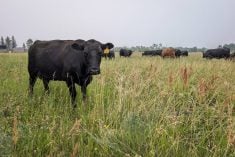Reuters — While Justin Trudeau vowed last week not to be pushed around and U.S. President Donald Trump called the Canadian prime minister “weak,” two key officials in their governments with a seemingly harmonious relationship were making fishing plans.
On Friday, U.S. Agriculture Secretary Sonny Perdue visited the farm of Canadian Agriculture Minister Lawrence MacAulay in the idyllic province of Prince Edward Island, best known as the fictional home of Anne of Green Gables.
Between meetings, the two men hauled up lobster traps and strolled the red earth of a potato farm.
Read Also

U.S. grains: Soy, corn dip on farmer selling; U.S.-China trade talks in focus
U.S. soybean futures retreated on Friday from a one-month high, pressured by a dip in crude oil prices and a round of farmer selling while market players awaited upcoming U.S. trade talks with China, the world’s top soybean buyer.
Canada’s protected dairy industry was a key issue for discussion after Trump renewed his attack on the sector for its high tariffs.
A supply management system matches Canadian production to domestic consumption, sets prices and imposes high tariffs to limit imports.
Perdue said on a conference call with reporters after the meetings that it was not the United States’ place to tell Canada it could not have a supply management system. But he said Canada’s system cannot result in oversupply of some products on the global market that depresses prices.
Perdue said the U.S. was likely to reach a trade deal with Mexico before Canada, with whom it has “intractable issues,” although he said he was still optimistic of reaching an agreement.
Canadian dairy officials have said U.S. overproduction due to subsidies was responsible for weak global prices.
MacAulay said earlier Friday that he and Perdue were not prepared to signal what changes might be coming in the North American Free Trade Agreement (NAFTA) or within supply management “because that’s the job for the people at the table.”
Negotiations on NAFTA have been overshadowed by Trump’s imposition of steel and aluminum tariffs, and Canada’s vows of retaliation.
With Trump and Trudeau out of step, the best hope for a breakthrough may come from Perdue and MacAulay, both 71, although direct trade negotiations are handled by the U.S. Trade Representative and Canada’s Foreign Minister.
The rapport between MacAulay, a former dairy farmer, and Perdue, the former Georgia governor, is “comforting,” said Ron Bonnett, president of the Canadian Federation of Agriculture.
“They might be the two people who can help find common ground,” he said.
The U.S. and Canadian farm sectors are better off working together than apart, said Kent Bacus, director of international trade and market access for the U.S.-based National Cattlemen’s Beef Association.
“Minister MacAulay and Secretary Perdue, they already have a strong relationship, and at times like this you really need to lean on those types of relationships,” he said.
Trade in farm products between the countries amounts to $47 billion annually, split roughly evenly, according to Agriculture and Agri-Food Canada. Huge volumes of meat and grain, as well as pigs and cattle cross the border daily.
Still, the issues can generate friction.
Perdue said on Friday that a 2016 pricing agreement, called Class 7, struck by Canadian dairy processors and farmers to allow processors to produce milk ingredients at globally competitive prices and limit imports from the U.S., was a key focus.
“I don’t know how we can go forward if Canada insists on a Class 7 part of their program.”
— Reporting for Reuters by Rod Nickel in Winnipeg and Tom Polansek in Chicago.
















